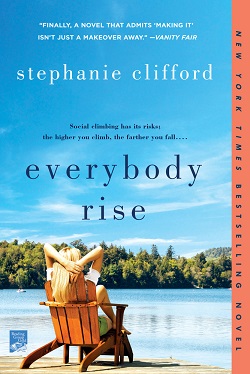I have a yen for books featuring rich people behaving badly, from modern novels like Kevin Kwan’s CRAZY RICH ASIANS and Miranda Beverly-Whittemore’s BITTERSWEET to classics by Edith Wharton and F. Scott Fitzgerald. The accoutrement of the wealthy might change, but so much remains the same: the impenetrable social hierarchies, the power struggles, and, of course, the outsider trying to gain acceptance to an elite crowd they both loathe and pine for.
Stephanie Clifford’s EVERYBODY RISE takes a page from Wharton, giving us 26-year-old Evelyn Beeger as a modern—and deliciously flawed—descendant of Lily Bart. Thanks to the scheming of a social-climbing mother and the hard work of a father who makes just enough to afford a fancy house and send his daughter to prep school, Evelyn is surrounded, though not entirely accepted, by the upper crust.
Evelyn parlays her connections into a job with People Like Us, a social networking site reminiscent of A Small World, which my New York friends and I were obsessed with for a while 10 years ago. But the quest to befriend New York’s elite quickly becomes more than a day job for Evelyn, and in no time, she goes native.
Camilla Rutherford, Evelyn’s mark-turned-friend-turned-foil, feels particularly familiar as the type of shallow “It girl” so celebrated in that era (think Paris Hilton, Tinsley Mortimer), who now seems about as fashionable as wearing Ugg boots with shorts.
Evelyn isn’t always easy to like—she lies, she backstabs, she throws over loyal friends and a decent boyfriend—but likability is overrated in fictional heroines. Evelyn is that wild, morally questionable friend you have in your twenties, the one you call when you want to paint the town red and maybe grace Page Six the next day.
Wharton’s Lily Bart cuts a far more sympathetic figure, not least because the social mores of the time make both her decisions and her downfall feel inevitable. Evelyn has plenty of choices—her family is well-off, her support system solid—so it’s gleeful fun to watch her make all of the wrong ones. My favorite scene is an absolute doozy: Evelyn ends up hungover, half-naked, and alone in a teepee, flashing back to the night before, during which she managed to betray her best friend, alienate most of her new ones, and scuttle her chances at a romance all in one drunken blaze of glory.
EVERYBODY RISE is set in the mid 2000s, the economic crash and recession looming like gathering storm clouds just off the horizon. The crisis is heavily foreshadowed, but Bernie Madoff’s private phone number is still a status symbol and most of Clifford’s characters live in a state of blissful, irrational, moneyed exuberance. I lived in New York from 2004 to 2010, and though I wasn’t in quite the rarefied circumstances Evelyn is, you couldn’t swing a Birkin bag without knocking over a gaggle of bankers with twice as much money as sense. Clifford’s vision of New York as a money-soaked, amoral orgy delivered me a queasy sort of nostalgia for the era.
Calm might come before a storm anywhere else, but in New York, the party lasted right until the thunderclap.









